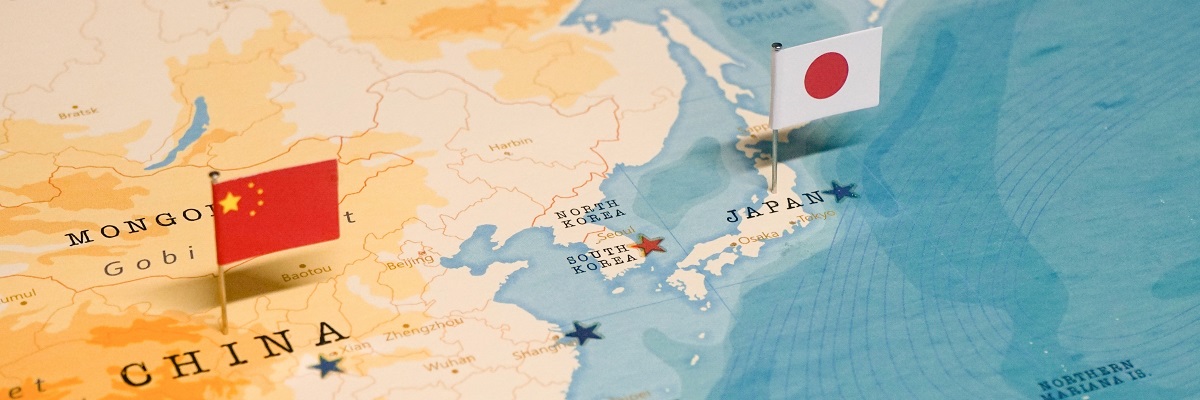Diplomacy
Japan-China Tensions Escalate

Image Source : Shutterstock
Subscribe to our weekly newsletters for free
If you want to subscribe to World & New World Newsletter, please enter
your e-mail
Diplomacy

Image Source : Shutterstock
First Published in: Oct.18,2023
Dec.01, 2023
Long-standing unresolved colonial history and territorial issues between China and Japan, as well as the two countries’ opposing world views, have increasingly manifested in the escalation of tensions. With high-level political/diplomatic communication at a standstill, the relationship has become adrift. In August 2023, the latest spate erupted when Japan decided to release treated radioactive wastewater from the Fukushima nuclear power plant into the Pacific Ocean. Although approved by the International Atomic Energy Agency, and considered safe by scientists, the discharge sparked vehement criticism from China which rejected the IAEA assessment. Yet it is common knowledge that China, South Korea, and Taiwan as well as many countries with nuclear facilities release radioactive tritium into the sea. Nevertheless, in China’s words, the Pacific Ocean is being used as “Japan’s private sewer.” Stating concerns with “food safety,” the Chinese government has suspended all Japanese seafood imports with an immediate economic impact and price falls in Japanese domestic seafood markets. Beyond the diplomatic row, trolling on Chinese social media and nuisance calls in their thousands have hit Japanese government agencies and businesses. China’s Global Times has characterised Japan as a “rogue state.” With the further planned releases of water, this issue will continue to simmer. Violent attacks in words and actions through Chinese social media and street demonstrations against Japan are not new. Attacks on Japanese establishments in China and anti-Japanese demonstrations have happened before. In 2005, when a new set of history textbooks was released in Japan, many Japanese establishments including the Japanese Embassy in Beijing became targets of attacks from protestors opposing what they called Japan’s attempt to whitewash history. Attacks on Japanese-brand cars and smashing windows of Japanese-owned businesses occurred again in the 2010s following Japan’s decision to nationalise the Senkaku islands which Japan administers but China claims and calls the Diaoyu islands. Tensions had begun to build in 2010 when a Chinese fishing boat rammed two Japanese Coast Guard vessels in the waters near disputed Islands and Japan detained the captain. It was not always like this. Japan and China enjoyed a long honeymoon period and close economic and diplomatic relations after they “normalised” ties and signed a peace treaty in the 1970s. Private investment and government aid poured enormous capital, technology, and human resources into the country, setting China on the path of modernisation. Exchanges at all levels intensified, shelving historical and territorial issues, ushering in an apparent golden era of bilateral ties. The cracks began to open as China started to overtake Japan when the latter was only slowly emerging from years of economic malaise. China overtook Japan as the world’s second-largest economy in 2010, a status Japan had enjoyed for four decades. With China’s prosperity came its economic dominance and military muscle flexing. Since the 2010s, old wounds once papered over, have reopened. China maintains and often claims that Japan has not properly apologised for its colonial and wartime atrocities and that their territorial disputes must be settled (in its favour). Tokyo though, believes it has done all it can and that Japan’s ownership of the Senkaku islands is indisputable. Given China’s now highly confrontational views, the once-strong pro-China constituency in Japan is thinning fast. Public opinion on both sides is now overwhelmingly negative towards the other. Japan considers its neighbourhood strategically far more challenging and dangerous today than at any time in the recent past. Besides North Korea’s sabre rattling and its deteriorating ties with Russia, China’s designs on Taiwan are of special concern as any forceful change in the status quo will have major implications for Japan’s security. Partially reflecting this belief, high-ranking Japanese politicians’ visits to Taiwan in recent months, including that of the Vice President of the ruling Liberal Democratic Party and former Prime Minister Taro Aso’s in August, are very significant. Aso’s call to deter China sends strong signals that Japan takes the China threat very seriously. As a result, Japan is substantially increasing its defence budget and has committed to a significant military build-up. Prime Minister Fumio Kishida has often referred to the war in Ukraine as akin to what possibly might happen in East Asia, that is, a possible Chinese invasion of Taiwan. These developments have enraged China, causing further deterioration in the relationship. China even cancelled a planned August visit by Natsuo Yamaguchi, the leader of the ruling party’s coalition ally, Komeito. This leaves no room for summitry at the leader level in the near future. Notably, Komeito, the political arm of the Buddhist Soka Gakkai, has been a key interlocutor between Tokyo and Beijing, since the 1970s. Japan-China tensions are not just limited to bilateral matters. Irreconcilable differences stem from their broader perspectives on world politics. Japan is deeply embedded in Western systems and advances the free-and-open Indo-Pacific, and has strengthenied military ties with the United States and its allies and partners. Japan offers alternative models of development to the Global South, such as quality infrastructure initiatives as opposed to China’s Belt and Road Initiative. Japan’s Quad initiatives, leadership in the Comprehensive and Progressive Trans Pacific Partnership and its support for AUKUS stand in contrast to China’s leadership in the BRICS, Shanghai Cooperation Organization, its “no limits” ties with Russia, and support for North Korea. Japan long separated politics and economics (seikei bunri) in its ties with China, but the boundaries which once kept economic ties strong despite political differences have weakened with what Japan calls China’s increasing economic coercion. The earlier narrative of “hot economics and cold politics” has given way to a new reality with all matters including an increasingly securitised economic relationship. With China’s “coercive and intimidating” behaviour such as its 2010 export ban on rare earth elements and the latest ban on seafood, Japan is cautiously but constantly trying to de-couple and de-risk as well as carry out onshoring and “friendshoring.” China remains Japan’s number one trading partner and a major destination for private capital, but this may well change, albeit gradually as Japanese businesses consider other options. Signs of some improvement through then Prime Minister Shinzo Abe’s visit to Beijing in 2018, and Prime Minister Fumio Kishida and President Xi Jinping’s meeting on the sidelines of a multilateral forum in 2022, may give a false impression of thawing, because the relationship has become so fractious and adversarial that progress remains elusive. As long as China continues flexing its military muscle and deploys economic coercion while building spheres of influence countering Japan; and Japan in turn strengthens its military ties with the US and establishes strategic partnerships to balance China, the relationship is unlikely to improve.
First published in :

Purnendra Jain is Emeritus Professor in the Department of Asian Studies at the University of Adelaide in Australia. His main research has focused on contemporary Japanese politics and foreign policy. He has also researched and written extensively on Japan-India, Japan-South Asia relations, Australia-Asia relations; regionalism and regional institutions; energy and foreign aid issues, comparative studies of the politics and foreign policy of Japan, China and India. His research results have been published in such journals as Asian Survey, Pacific Review, International Relations of the Asia Pacific, Japan Forum, Japanese Studies, Leviathan, Global Asia, Australian Journal of International Affairs, Asian Journal of Comparative Politics, etc. His most recent book is Japan's Foreign Policy in the Twenty-first Century (co-edited with Lam Peng Er) (2020; paperback 2022).
Unlock articles by signing up or logging in.
Become a member for unrestricted reading!